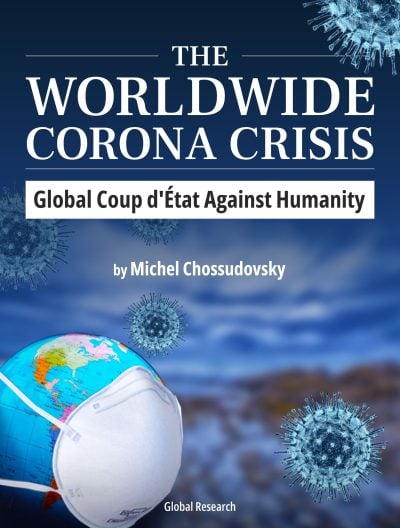New Study Confirms What We Knew All Along : mRNA COVID-19 Vaccines Are Associated with More Serious Harms Than Originally Claimed

All Global Research articles can be read in 51 languages by activating the Translate Website button below the author’s name.
To receive Global Research’s Daily Newsletter (selected articles), click here.
Follow us on Instagram and Twitter and subscribe to our Telegram Channel. Feel free to repost and share widely Global Research articles.
***
A new study published in the journal Vaccine examines the occurrence of serious adverse events following adult clinical trials of the Pfizer and Moderna mRNA COVID-19 vaccines.
Authored by researchers from the United States, Spain and Australia, the analysis reveals that together these vaccines were associated in the trials with an excess risk of ‘serious adverse events of special interest’ of 12.5 per 10,000 people vaccinated.
Describing how their results raise concern that mRNA vaccines are associated with more harm than initially estimated at the time they were given emergency authorization, the researchers say their findings point to the need for formal harm-benefit analyses to be conducted.
The analysis carried out in the study utilizes a priority list created in March 2020 by the Brighton Collaboration, a vaccine safety research network. Endorsed by the World Health Organization and subsequently updated, the list contains potential adverse events relevant to COVID-19 vaccines. The Vaccine journal researchers adapted the Brighton Collaboration list to evaluate serious adverse events of special interest observed in the Pfizer and Moderna mRNA COVID-19 vaccine trials.
Serious adverse events resulting from mRNA vaccines
The researchers describe how, to the best of their knowledge, the Brighton Collaboration’s list has not previously been applied to serious adverse events in randomized trial data. They therefore sought to investigate the association between mRNA COVID-19 vaccines authorized by the United States Food and Drug Administration (FDA) and serious adverse events identified by the Brighton Collaboration, using data from the randomized, placebo-controlled clinical trials on which the authorizations were based.
For the purposes of the vaccine trials, serious adverse events were defined as being adverse events that result in either death; an incident that was life-threatening at the time of the event; inpatient hospitalization or prolongation of existing hospitalization; persistent or significant disability/incapacity; a congenital anomaly/birth defect; or a medically important event, based on medical judgment.
The researchers found that the Pfizer trial exhibited a particularly notable 36 percent higher risk of serious adverse events occurring in the vaccine group compared to the placebo group. The Moderna trial exhibited a 6 percent higher risk of such events occurring in the vaccine group compared to the placebo group. Overall, compared to trial participants receiving placebos, the researchers found that the recipients of mRNA vaccines had a 16 percent higher risk of experiencing serious adverse events.
Serious adverse events of special interest
The researchers also evaluated serious adverse events of special interest observed in the Pfizer and Moderna mRNA COVID-19 vaccine trials. Such events included coagulation disorders, cardiac disorders, and other serious problems.
In the Pfizer trial, serious adverse events of special interest were reported in the vaccine group at a rate equivalent to 27.7 incidents per 10,000 people vaccinated. For each 1 million people vaccinated, this would translate into an excess risk of 2,770 serious adverse events. Compared to the placebo group, people receiving the Pfizer vaccine had a 57 percent higher risk of experiencing a serious adverse event of special interest.
In the Moderna trial, serious adverse events of special interest were reported in the vaccine group at a rate equivalent to 57.3 incidents per 10,000 people vaccinated. For each 1 million people vaccinated, this would translate into an excess risk of 5,730 serious adverse events. People receiving the Moderna vaccine had a 36 percent higher risk of experiencing a serious adverse event of special interest than those in the placebo group.
Overall, compared to those in the placebo group, people receiving these vaccines had a 43 percent higher risk of experiencing a serious adverse event of special interest. Together, the Pfizer and Moderna vaccines were associated with an excess risk of serious adverse events of special interest equivalent to 12.5 per 10,000 people vaccinated. For each 1 million people vaccinated, this would translate into an excess risk of 1,250 serious adverse events.
A rational health policy would consider potential harms
Disturbingly, the researchers note that in both the Pfizer trial and the Moderna trial, the excess risk of serious adverse events of special interest was actually higher than the risk reduction for COVID-19 hospitalization. This is clearly contrary to what the general public has been led to believe. As the researchers correctly point out, rational health policy formation should consider potential harms alongside potential benefits.
In their conclusion, the researchers argue that a systematic review and meta-analysis using individual trial participant data should be undertaken to address questions of harm-benefit in various demographic subgroups, particularly in people at low risk of serious complications from COVID-19. They add that full transparency of COVID-19 vaccine clinical trial data is needed to properly evaluate these questions. Unfortunately, however, 2 years after the global rollout of COVID-19 vaccines, the fact is that participant level trial data remain inaccessible.
While non-transparency might be in the financial interests of the vaccine industry, it most definitely isn’t in the health interests of the general public. If the companies manufacturing mRNA vaccines really have nothing to hide, it’s time for them to come clean and prove it.
*
Note to readers: Please click the share buttons above. Follow us on Instagram and Twitter and subscribe to our Telegram Channel. Feel free to repost and share widely Global Research articles.
This article was originally published on Dr. Rath Health Foundation.
Executive Director of the Dr. Rath Health Foundation and one of the coauthors of our explosive book, “The Nazi Roots of the ‘Brussels EU’”, Paulis also our expert on the Codex Alimentarius Commission and has had eye-witness experience, as an official observer delegate, at its meetings. You can find Paul on Twitter at @paulanthtaylor
He is a regular contributor to Global Research.
Featured image is from fernandozhiminaicela/Pixabay
 The Worldwide Corona Crisis, Global Coup d’Etat Against Humanity
The Worldwide Corona Crisis, Global Coup d’Etat Against Humanity
by Michel Chossudovsky
Michel Chossudovsky reviews in detail how this insidious project “destroys people’s lives”. He provides a comprehensive analysis of everything you need to know about the “pandemic” — from the medical dimensions to the economic and social repercussions, political underpinnings, and mental and psychological impacts.
“My objective as an author is to inform people worldwide and refute the official narrative which has been used as a justification to destabilize the economic and social fabric of entire countries, followed by the imposition of the “deadly” COVID-19 “vaccine”. This crisis affects humanity in its entirety: almost 8 billion people. We stand in solidarity with our fellow human beings and our children worldwide. Truth is a powerful instrument.”
ISBN: 978-0-9879389-3-0, Year: 2022, PDF Ebook, Pages: 164, 15 Chapters
Price: $11.50 Get yours for FREE! Click here to download.
We encourage you to support the eBook project by making a donation through Global Research’s DonorBox “Worldwide Corona Crisis” Campaign Page.

